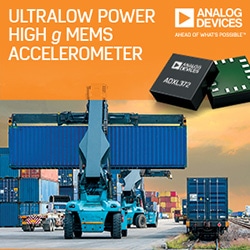Analog Devices, Inc. today announced a next-generation accelerometer designed for long-period monitoring of the physical condition of high-value assets. With its extremely low power capabilities, the ADXL372 micropower high-g MEMS accelerometer targets Internet of Things (IoT) solutions where shock and impact on a unit during storage, transit, or use would adversely affect its function, safety, or reliability.

Representative assets include materials inside shipping and storage containers, factory machinery, and battery powered products where there may be lengthy quiet periods punctuated by spontaneous, severe impacts.
Unlike comparable sensors, this ultralow power MEMS sensor has an "instant on" feature and can wake up immediately to acquire the entire waveform, which significantly reduces standby power drain. The resulting low current requirement of less than two microamps while waiting for an impact typically yields years of operation from a single small battery when the sensor is used in a motion-activated system. By using the ADXL372 MEMS accelerometer as part of a remote edge-node device in an IoT application, transient events can be captured and categorized by a localized processor beforehand by being sent to the cloud or other data center via a wireless link.
Keeping the analysis localized saves power, time, and prevents unnecessary transfer of data for an event that is actually insignificant.
The wide bandwidth of 3200 Hz and dynamic range of ±200 g make it an excellent fit for a diverse set of asset health-monitoring applications including monitoring of concussions for indication of Traumatic Brain Injury in both athletes and military personnel.
The ADXL372, specified over the –40 ⁰C to 105 ⁰C range, joins the industry-leading ultralow power, low g ADXL362 MEMS accelerometer as part of ADI’s broader ultralow power portfolio of sensors. Both the ADXL372 and ADXL362 accelerometers interface seamlessly with the ultralow power ADuCM4050 microcontroller, which was recently added to the series of IoT-optimized microcontrollers. Other leading-edge microcontrollers include the ADuCM3027 and ADuCM3029; all of these devices feature both active and hibernate modes with ultralow power demands, and target applications where power consumption, security, and robustness are key requirements.
Pricing & Availability
| Product |
Output Interface |
Full Production |
Price Each per 1,000 |
Packaging |
| ADXL372 |
Digital |
Now |
$6.33 |
3 × 3 mm, 16-lead LGA |